How to use Array objects in JavaScript
How to use the How to use Array objects in JavaScript object in JavaScript: First create a code file; then use new to create an array object; finally use the How to use Array objects in JavaScript object to process the array.

The operating environment of this article: windows7 system, javascript version 1.8.5, Dell G3 computer.
The array object of JavaScript is also one of the built-in functions of JavaScript. The How to use Array objects in JavaScript object is used to process arrays. When using the How to use Array objects in JavaScript object, we need to first create an array object with new.
We have already introduced how to create a built-in function in How to use the string object in JavaScriptIn this article, we will create it directly with new An How to use Array objects in JavaScript object
var family= new How to use Array objects in JavaScript();
Then let’s look at the specific example
The code is as follows
Add "Tom", "Jerry", "Soucy" and Use console.log to invoke debugging.
<!DOCTYPE html>
<html>
<head>
<meta charset="utf-8">
<title>JavaScript</title>
</head>
<body>
<script>
var family= new How to use Array objects in JavaScript("Tom", "Jerry", "Soucy");
console.log(family);
</script>
</body>
</html>The operation effect is as follows
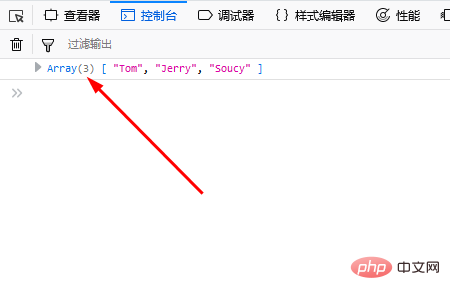
Next let’s take a look at the properties and methods of the How to use Array objects in JavaScript object
Properties 1. length (Get the array length)
The code is as follows
<script>
var family= new How to use Array objects in JavaScript("Tom", "Jerry", "Soucy");
console.log(family.length);
</script>The running effect is as follows
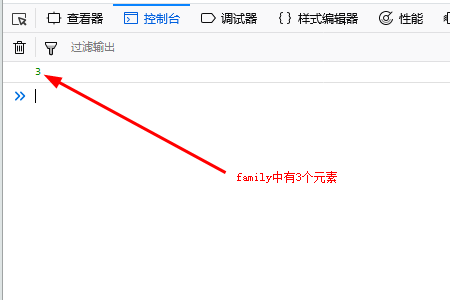
In the family array There are three elements: Tom, Jerry, and Soucy, so it is displayed as 3.
About length and attributes
Replace the number of elements in the length attribute of the arrangement. If the number of elements after substitution is smaller than the number of elements before substitution, the elements will also be deleted.
This time, the length attribute of the arrangement of "Taro", "Jiro", and "Saburo" substitutes 2 for ""Taro", "Jiro".
Then please explain each code.
The initial value is as follows.
By assigning the number of elements to the length property of the array, if the number of elements after assignment is less than the number of elements before replacement, the element will be deleted.
At this time, ["Tom", "Jerry", "Soucy"] sets the length attribute of the array to 2, and the array becomes ["Tom", "Jerry"].
Let’s explain
The initial value is as follows.
var family = ['Tom', 'Jerry', 'Soucy'];
The length of the family array with an element of 3 is set to 2
family.length = 2;
At this time, the elements of the array family will Delete one and display the code of the array as follows.
console.log(family)
The value of the array at this time is ['Tom', 'Jerry'].
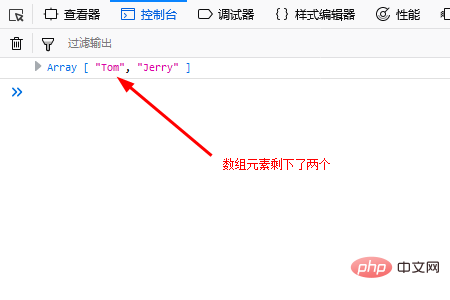
This is the code to display the array element subscript at this time.
console.log(Object.keys(family));
The displayed result is 0, 1.
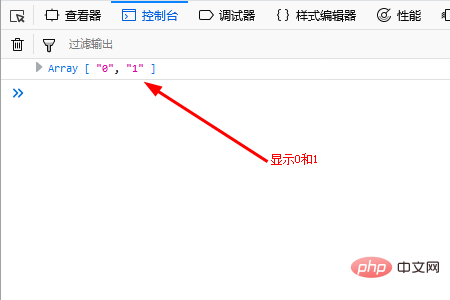
The code to display the current array length is as follows
console.log(family.length);
The display result is 2
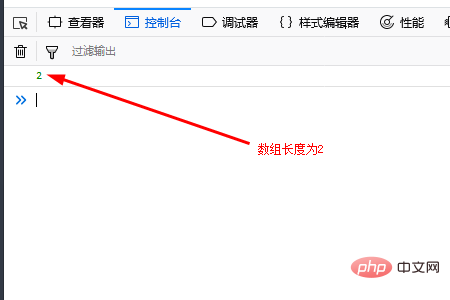
Let’s try to get the first element
We write the code as follows
console.log(family.1);
However, because the syntax is different, an error will occur. The following results will be displayed
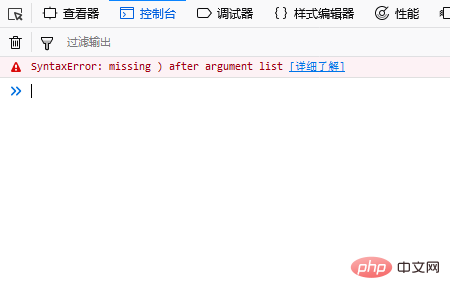
This is to display the current second element (subscript 1) Correct syntax code.
console.log(family[1]);
The running result is as follows
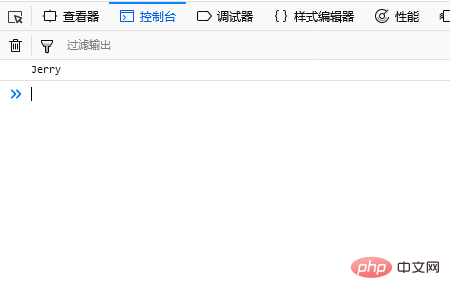
This is the code to display the element with the subscript value 1, which is passed through the length of the array family The number obtained by decrementing the attribute by 1.
console.log(family[family.length - 1]);
The running result is the same as above
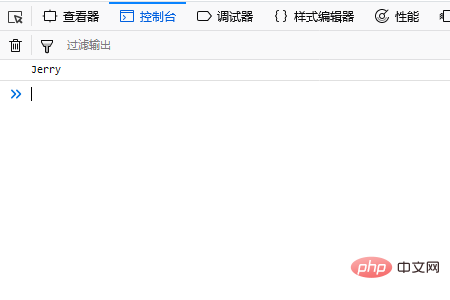
Methods of How to use Array objects in JavaScript object
Method 1. slice() (get array elements)
In the slice() method, you can search for the specified element by specifying the subscript.
(subscript How to use Array objects in JavaScript elements are numbered, starting from 0 and going to n...)
When retrieving elements, the subscript of the starting position and the subscript of the ending position must be specified in (). If a specific range is not specified, the last element will be retrieved starting from the first element.
Let’s look at a specific example
<script>
var family= new How to use Array objects in JavaScript("Tom", "Jerry", "Soucy");
console.log(family.slice(0,2));
</script>The running results are as follows
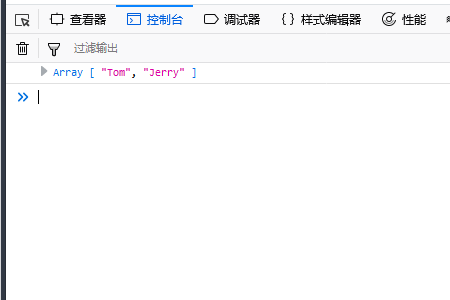
slice(0,2)指的是从下标为0的元素开始到下标为2的元素前,所以运行结果是"Tom", "Jerry"。
还有需要知道的是:
如果slice(0),则显示"Tom", "Jerry", "Soucy"
如果slice(0,1),则显示"Tom"
如果slice(1),则显示"Jerry", "Soucy"
如果slice(1,2),则显示"Jerry"
如果slice(2),则显示"Soucy"
方法2. reverse()(翻转元素顺序)
代码如下
<script>
var family= new How to use Array objects in JavaScript("Tom", "Jerry", "Soucy");
console.log(family.reverse());
</script>运行结果如下:顺序翻转了过来
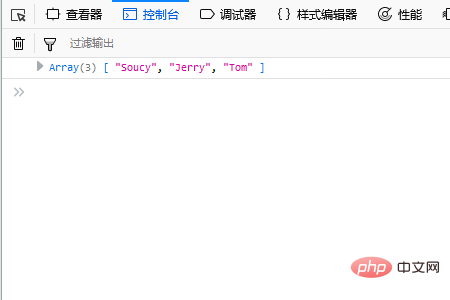
方法3. push()(在末尾添加新元素)
在push()中,您可以在数组末尾添加一个新元素,并在添加后获取元素数。
代码如下
<script>
var family= new How to use Array objects in JavaScript("Tom", "Jerry", "Soucy");
console.log(family.push("Marry", "Cindy"));
</script>运行效果如下
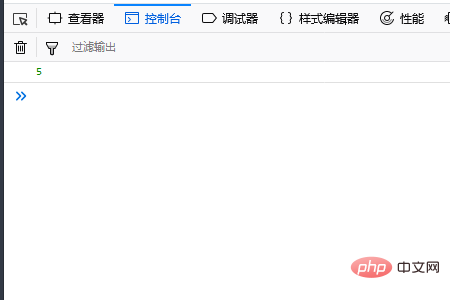
元素个数从3增加到了5,如果要显示增加的元素,可以再输入以下代码
console.log(family)
运行结果如下
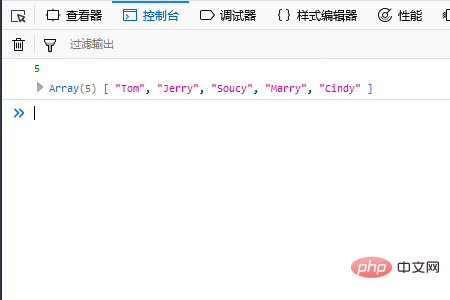
The above is the detailed content of How to use Array objects in JavaScript. For more information, please follow other related articles on the PHP Chinese website!

Hot AI Tools

Undresser.AI Undress
AI-powered app for creating realistic nude photos

AI Clothes Remover
Online AI tool for removing clothes from photos.

Undress AI Tool
Undress images for free

Clothoff.io
AI clothes remover

Video Face Swap
Swap faces in any video effortlessly with our completely free AI face swap tool!

Hot Article

Hot Tools

Notepad++7.3.1
Easy-to-use and free code editor

SublimeText3 Chinese version
Chinese version, very easy to use

Zend Studio 13.0.1
Powerful PHP integrated development environment

Dreamweaver CS6
Visual web development tools

SublimeText3 Mac version
God-level code editing software (SublimeText3)

Hot Topics
 1666
1666
 14
14
 1425
1425
 52
52
 1327
1327
 25
25
 1273
1273
 29
29
 1252
1252
 24
24
 JavaScript Engines: Comparing Implementations
Apr 13, 2025 am 12:05 AM
JavaScript Engines: Comparing Implementations
Apr 13, 2025 am 12:05 AM
Different JavaScript engines have different effects when parsing and executing JavaScript code, because the implementation principles and optimization strategies of each engine differ. 1. Lexical analysis: convert source code into lexical unit. 2. Grammar analysis: Generate an abstract syntax tree. 3. Optimization and compilation: Generate machine code through the JIT compiler. 4. Execute: Run the machine code. V8 engine optimizes through instant compilation and hidden class, SpiderMonkey uses a type inference system, resulting in different performance performance on the same code.
 Python vs. JavaScript: The Learning Curve and Ease of Use
Apr 16, 2025 am 12:12 AM
Python vs. JavaScript: The Learning Curve and Ease of Use
Apr 16, 2025 am 12:12 AM
Python is more suitable for beginners, with a smooth learning curve and concise syntax; JavaScript is suitable for front-end development, with a steep learning curve and flexible syntax. 1. Python syntax is intuitive and suitable for data science and back-end development. 2. JavaScript is flexible and widely used in front-end and server-side programming.
 From C/C to JavaScript: How It All Works
Apr 14, 2025 am 12:05 AM
From C/C to JavaScript: How It All Works
Apr 14, 2025 am 12:05 AM
The shift from C/C to JavaScript requires adapting to dynamic typing, garbage collection and asynchronous programming. 1) C/C is a statically typed language that requires manual memory management, while JavaScript is dynamically typed and garbage collection is automatically processed. 2) C/C needs to be compiled into machine code, while JavaScript is an interpreted language. 3) JavaScript introduces concepts such as closures, prototype chains and Promise, which enhances flexibility and asynchronous programming capabilities.
 JavaScript and the Web: Core Functionality and Use Cases
Apr 18, 2025 am 12:19 AM
JavaScript and the Web: Core Functionality and Use Cases
Apr 18, 2025 am 12:19 AM
The main uses of JavaScript in web development include client interaction, form verification and asynchronous communication. 1) Dynamic content update and user interaction through DOM operations; 2) Client verification is carried out before the user submits data to improve the user experience; 3) Refreshless communication with the server is achieved through AJAX technology.
 JavaScript in Action: Real-World Examples and Projects
Apr 19, 2025 am 12:13 AM
JavaScript in Action: Real-World Examples and Projects
Apr 19, 2025 am 12:13 AM
JavaScript's application in the real world includes front-end and back-end development. 1) Display front-end applications by building a TODO list application, involving DOM operations and event processing. 2) Build RESTfulAPI through Node.js and Express to demonstrate back-end applications.
 Understanding the JavaScript Engine: Implementation Details
Apr 17, 2025 am 12:05 AM
Understanding the JavaScript Engine: Implementation Details
Apr 17, 2025 am 12:05 AM
Understanding how JavaScript engine works internally is important to developers because it helps write more efficient code and understand performance bottlenecks and optimization strategies. 1) The engine's workflow includes three stages: parsing, compiling and execution; 2) During the execution process, the engine will perform dynamic optimization, such as inline cache and hidden classes; 3) Best practices include avoiding global variables, optimizing loops, using const and lets, and avoiding excessive use of closures.
 Python vs. JavaScript: Community, Libraries, and Resources
Apr 15, 2025 am 12:16 AM
Python vs. JavaScript: Community, Libraries, and Resources
Apr 15, 2025 am 12:16 AM
Python and JavaScript have their own advantages and disadvantages in terms of community, libraries and resources. 1) The Python community is friendly and suitable for beginners, but the front-end development resources are not as rich as JavaScript. 2) Python is powerful in data science and machine learning libraries, while JavaScript is better in front-end development libraries and frameworks. 3) Both have rich learning resources, but Python is suitable for starting with official documents, while JavaScript is better with MDNWebDocs. The choice should be based on project needs and personal interests.
 Python vs. JavaScript: Development Environments and Tools
Apr 26, 2025 am 12:09 AM
Python vs. JavaScript: Development Environments and Tools
Apr 26, 2025 am 12:09 AM
Both Python and JavaScript's choices in development environments are important. 1) Python's development environment includes PyCharm, JupyterNotebook and Anaconda, which are suitable for data science and rapid prototyping. 2) The development environment of JavaScript includes Node.js, VSCode and Webpack, which are suitable for front-end and back-end development. Choosing the right tools according to project needs can improve development efficiency and project success rate.




